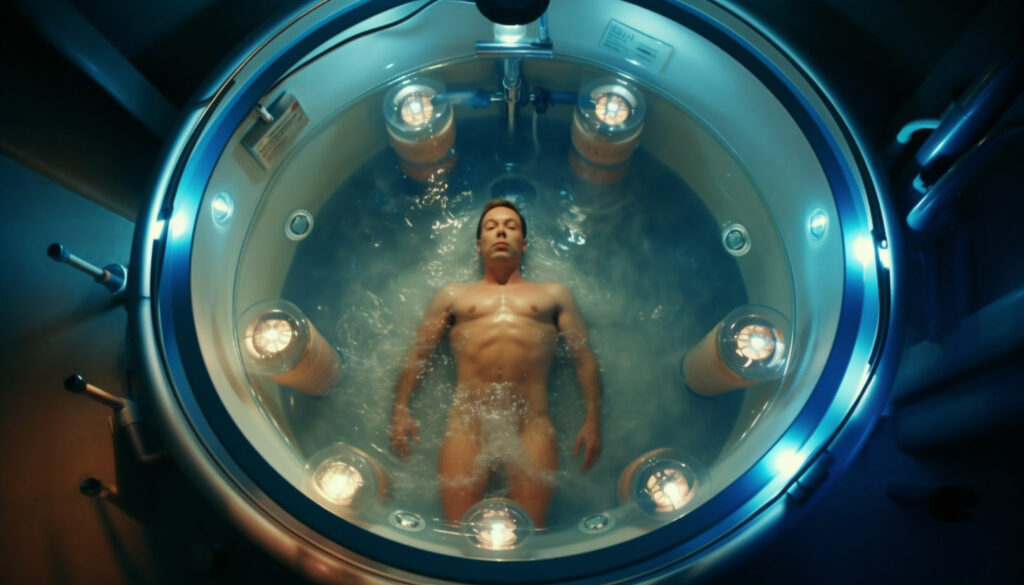• Mindfulness offers mental clarity in today’s chaotic digital age, challenging traditional beliefs about constant connectivity.
• Scientific studies show mindfulness reshapes our brains, enhancing memory, empathy, and reducing stress.
• Biohacking views mindfulness as a tool for mental optimization, aligning with techniques like meditation and digital detox.
• Techniques like sensory deprivation tanks, nature immersion, and mindful nutrition directly impact mental clarity and overall well-being.
• Physical practices, including yoga, Tai Chi, and breathwork, offer dual benefits of physical fitness and mental focus.
• Overcoming mindfulness challenges involves debunking myths, understanding time flexibility, and recognizing its tangible, science-backed benefits.
The Modern Man’s Mental Maze
In an age where our phones buzz more than bees and our inboxes are fuller than a Thanksgiving turkey, it’s no wonder our brains feel like they’re running the mental equivalent of a marathon—daily. From juggling work emails at the dinner table to doom-scrolling through social media at 2 am, the modern man’s mind is more cluttered than a teenager’s bedroom. But what if there was a way to declutter, to find that elusive mental clarity amidst the chaos? Enter the world of mindfulness.
The Science of Mindfulness: More Than Just a Buzzword
Mindfulness. It’s not just the trendy word your yoga-loving friend keeps dropping. Originating from ancient Buddhist practices, mindfulness is the art of being fully present in the moment. Think of it as giving your overworked brain a much-needed vacation.
But don’t just take our word (or your friend’s) for it. Science has entered the chat. Neurological studies have shown that regular mindfulness practices can literally reshape our brains. Areas linked to memory, empathy, and stress shrink or expand, making us better equipped to handle life’s curveballs. And as for cognitive function? Let’s just say practicing mindfulness might just be the upgrade your brain’s operating system has been waiting for. It’s like turning your brain from a cluttered attic into a well-organized office.
The Biohacker’s Approach to Mindfulness
For the uninitiated, biohacking might sound like something out of a sci-fi movie. But in reality, it’s all about optimizing human performance. And what’s the most powerful tool in the biohacker’s arsenal? No, it’s not a fancy gadget or a secret supplement. It’s the brain.
By viewing mindfulness as a form of mental biohacking, we can start to see the synergy between the two. Both are about optimization, fine-tuning, and, let’s face it, getting an edge in a world that doesn’t stop spinning. So, while your neighbor might be biohacking his morning with a bulletproof coffee, you’ll be supercharging your brain with a dose of daily mindfulness. And trust us, your brain will thank you for it.

Techniques to Boost Mindfulness and Mental Clarity
Meditation Practices
Ever tried emptying your mind, only to have it flooded with thoughts of that embarrassing thing you did 10 years ago? Welcome to meditation, where the goal isn’t to suppress thoughts but to observe them.
Guided vs. unguided meditation: Think of guided meditation as GPS for your brain. A voice (hopefully soothing) guides you, while unguided is more of a solo adventure. Both have their merits; it’s like choosing between a tour guide and wandering aimlessly in a new city.
Breath-focused techniques: It’s all about the breath, baby. Focusing on your breathing is like giving your mind a chew toy. It distracts it from wandering and brings you back to the present.
Body scan and progressive relaxation: Ever done a mental TSA scan of your own body? It’s about noticing tension and letting it go, one body part at a time. By the end, you’re more relaxed than a cat in a sunbeam.
Digital Detox
In a world where our phones have become an extension of our hands, unplugging can feel like you’ve lost a limb. But trust us, it’s worth it.
The impact of constant connectivity on mental clarity: Ever felt like your brain’s got too many tabs open? That’s the digital age for you. Constant notifications are like someone poking you non-stop. Annoying, right?
Scheduled breaks from technology: Think of it as intermittent fasting for your brain. Just a short break can recharge those mental batteries.
The benefits of periodic tech-free days: It’s like a spa day for your mind. And the best part? No one can bother you with work emails.
Sensory Deprivation Tanks
Sounds sci-fi, but it’s more spa than space.
The science behind float tanks: Imagine floating in a saltwater tank, devoid of all distractions. It’s just you and your thoughts. Kind of like being in space, but without the aliens.
Benefits for relaxation, creativity, and mental clarity: Some say it’s like hitting the reset button on your brain. Others claim they’ve had their best ideas in there. Either way, it’s a trip worth taking.

Nature Immersion
Remember nature? That green stuff outside your window?
The concept of “forest bathing” and its origins: No, it doesn’t involve a tub in the woods. Originating from Japan, it’s all about soaking in the forest atmosphere. And no, there’s no soap involved.
The physiological and psychological benefits of spending time in nature: Trees don’t send emails or demand deadlines. They’re the world’s best (and quietest) therapists.
Mindful Nutrition: Feeding the Brain
You are what you eat. And your brain? Well, it’s hungry.
The gut-brain connection: Your stomach and brain are in a long-term relationship. Feed one junk, and the other throws a tantrum. It’s all about balance.
Superfoods and nootropics for cognitive enhancement: Think of them as brain steroids (the legal kind). From blueberries to certain supplements, they give your brain that extra oomph.
The importance of hydration: Your brain’s like a sponge. Don’t let it dry out. Water’s its best friend. So, keep it hydrated, and it’ll reward you with clarity.
Physical Practices that Complement Mindfulness
Yoga and Tai Chi
Ever tried touching your toes and ended up pondering the meaning of life? That’s the magic of yoga and Tai Chi for you.
The dual benefits: Physical fitness and mental focus: While you’re trying to nail that warrior pose or perfect the Tai Chi wave, you’re also giving your mind a workout. It’s like a two-for-one deal, minus the cheesy sales pitch.
How these practices promote mindfulness and clarity: Both demand your full attention. Lose focus, and you might just find yourself toppling over or waving at an imaginary friend. But stick with it, and you’ll find a sense of calm and clarity that’s better than any post-workout high.

Breathwork Techniques
Breathing: You’ve been doing it since birth. But are you doing it right?
The science of controlled breathing: It’s not just about inhaling and exhaling. It’s about harnessing the power of your breath to control your mind and body. Think of it as your internal remote control.
Practices like the Wim Hof Method and their benefits: Ever wanted to feel like a human icicle or climb mountains in your shorts? Maybe not. But the Wim Hof Method, which combines specific breathing techniques with cold exposure, promises increased energy, reduced stress levels, and a boosted immune system. Not too shabby for something as simple as breathing, right?
Overcoming Challenges: Common Barriers to Mindfulness
The myth of being “bad” at meditation: So, your mind wandered to what’s for dinner during meditation. That doesn’t mean you’re bad at it. It just means you’re human. And hungry.
Time constraints and the misconception of needing long sessions: Think you need hours of meditation to reap the benefits? Think again. Even just a few minutes can make a difference. It’s like a power nap for your brain.
Addressing skepticism and understanding the tangible benefits: For the doubters out there, yes, there’s science-backed evidence on the benefits of mindfulness. And no, you don’t have to chant or wear flowy robes (unless that’s your thing).
The Clear Path Forward
In the hustle and bustle of modern life, a little mental clarity goes a long way. And with the tools and techniques we’ve explored, that clear path forward is right at your fingertips. So, whether you’re diving deep into meditation, trying out Tai Chi, or simply focusing on your breath, remember: mindfulness isn’t just a practice. It’s a lifestyle. And for the modern man, it’s a game-changer. So, why not give it a shot? Your brain will thank you.


